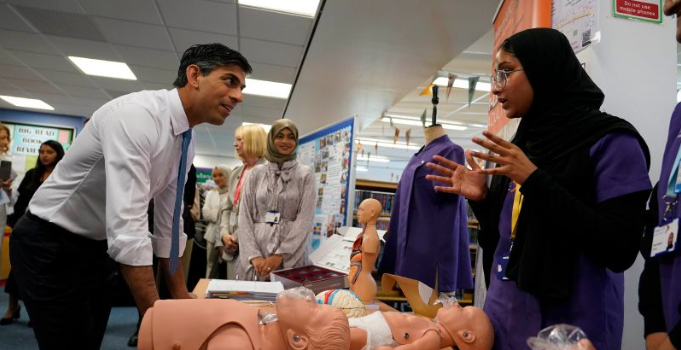
Prime Minister and Opposition Clash Over Tax Plans for Independent Education
Prime Minister Rishi Sunak has accused the Labour Party of instigating a “class war” with its proposal to introduce a 20% VAT on private school fees if it wins the next election. Sunak, who attended the prestigious Winchester College, argued that Labour’s policy would unfairly target the aspirations of parents who work tirelessly to afford an independent education for their children.
Speaking to BBC South Today, Sunak criticised Labour’s stance, claiming the party failed to understand the hard work and sacrifices made by parents to secure a better future for their children. “Labour’s approach is to clamp down on that aspiration,” he said. “They want to punish families as part of some class war.”
The Prime Minister’s comments were swiftly condemned by Labour’s shadow education secretary, Bridget Phillipson, who called them an “insult” to families across the country. She argued that the VAT change would help fund a better education system for all, ensuring that state schools received the investment they needed to improve. Labour’s proposal includes not only the VAT on school fees but also plans to remove business rates relief currently enjoyed by private schools.
The controversy deepened when it was revealed that Sunak, while serving as Chancellor, had personally donated £100,000 to Winchester College to support bursaries for children unable to afford the school’s hefty fees, which exceed £36,000 per year. This led Labour to accuse the Prime Minister of being out of touch with the reality faced by most families in the UK.
The debate also drew attention from Sir Keir Starmer’s former school, Reigate Grammar, where the headmaster, Shaun Fenton, urged the Labour leader to reconsider the VAT proposal. Fenton warned that the new tax could drive thousands of children from independent schools into the state system, potentially causing more strain on an already overburdened sector. He argued that the measure would not improve education for any child, nor would it generate significant revenue.
The Labour Party, citing a study by the Institute for Fiscal Studies, believes that reforming tax rules for private schools could raise as much as £1.5 billion annually, money that could be reinvested into the state school system. Starmer has defended the policy, insisting that it is part of Labour’s mission to ensure that state schools offer an education “just as good” as the independent sector, and maintaining that private schools would not need to pass the extra costs on to parents.
However, the proposal has sparked fierce debate within the political arena, with the Conservatives accusing Labour of backtracking on its plans. Chief Secretary to the Treasury John Glen remarked that the Opposition was acknowledging that their school tax proposal “just doesn’t work” and would fail to deliver the intended outcomes.









